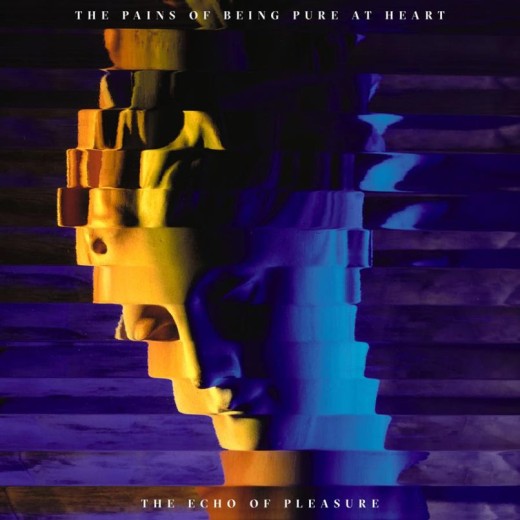On their fourth full length release, The Echo of Pleasure, The Pains of Being Pure At Heart have taken a sharp stab at the all consuming 80s aesthetic that has engulfed the world over recent months. It wraps itself around the guts of frontman Kip Burman’s thoughts as he patiently waits to become a father, exploring ideas of love, longing and the human experience.
Waiting to become a father is a peculiar state of limbo to be in. While you count down the days, you are already living in the altered existence that comes with having a child. On this particular record the focus of the matter is less on the actual birth and more on the focus of Burman’s thoughts on the human experience, his relationship with his wife and in what ways it has been changed by both distance and the eternal bond of parenthood.
Nostalgia comes in waves while listening to the title track, as the frontman’s reflections on the past come forward. He reveals that “remembering is a kind of echo, each instance slightly less vivid than the one before”, implying that every experience of joy fades eventually, and we must continuously chase after more to satisfy ourselves. ‘When I Dance With You’ plays on the feverish joy that consumes us in an intense flutter of love, repeating the words “I feel okay” throughout, embellishing his relationship with that adoration. Similarly on ‘Anymore’, he masks somewhat grim content with an infectiously optimistic song, crooning “I wanted to die with you”, pushing the idea forward that having a child with his wife has solidified their relationship to a point wherein he wishes to perish as the same time as her. If that sounds familiar, it’s because it is. The Smiths released a song with an almost identical mantra in the 80s. And that leads us directly into the downfall of this album.
Despite a few standout tracks and admirable subject matter, as a whole the album loses its nostalgic and emotional appeal after few repeated listens. The synths become more of a dedication to the 80s than a resurgence of them as their typicality emerges. The lack of innovation isn’t only seen in direct contrast to their previous endeavour, Days of Abandon, which featured a greater demonstration of control and tact, but also when compared to other modern releases that haven’t even had time to accumulate dust. This sort of 80s blast may have performed admirably a year ago, before major artists started jumping on the same bandwagon, but now it appears as an outlier in their catalogue that stands for nothing other than its own sickly devotion to a particular decade. Tracks like ‘The Echo of Pleasure’ and ‘The Garett’ collide to create an almost indistinguishable hubbub of wispy vocals and coagulated synth. It’s hard not to consider bands like The Cure, The Smiths and New Order when listening to this record, and despite the formidable reputation of these bands, that’s not a good thing. The familiarity that the record exudes is one that Pains have escaped up until this point, but in relying so heavily on one particular influence, Burman has crippled himself in reaching too far into the past and borrowing one too many ploys.
The Echo of Pleasure is certainly not the best release we’ve heard from Pains, and it’s likely not the last. While some tracks are genuinely enjoyable to listen to, they are still part of a mishandled approach to creating a unique, audience grabbing release. Leaning so heavily on an aesthetic is rarely a risky move, but when that aesthetic carries the names of some of the biggest artists of all time, it’s important to ensure that you’re adding more to it than your own vocals and a few indie-pop guitar riffs here and there. Mitchell Goudie






